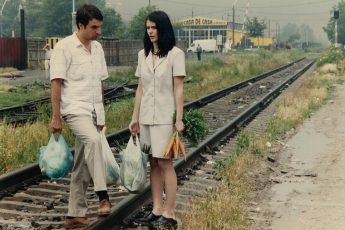
This month we continue our 2011 focus on Romanian cinema by looking at the work of Adrian Sitaru. After graduating from the U.N.A.T.C film school, Sitaru made his debut feature with Hooked in 2007. In Hooked, a couple sets out on a weekend trip that goes off-track when they make an unexpected encounter. The film is entirely shot from the POV perspective, a subjective approach that Sitaru will apply again in Best Intentions, his second feature, that tells the story of a young man who develops a neurotic anxiety when his mother is taken to the hospital. In his review, Moritz Pfeifer challenges the film as a critique of current Romanian cinema. Although Best Intentions received two awards at the Locarno Film Festival, the Leopard for best director was somewhat disputed, e. g. in Martin Walder’s article for the Neue Zürcher Zeitung. In our interview with Sitaru, he speaks about Alex – the protagonist of Best Intentions-, the inspiration for the film, and about its connection to real life.
In our Retrospectives section, you will find our critiques of Cristian Mungiu’s Occident and Lucian Pintilie’s The Reenactment. In Occident, Cristian Mungiu’s first film, westernization in Romania is packed into a love-story. While the West is often personified, and sometimes even over-present in some Eastern European films, Mungiu offers a slightly different approach to this dichotomy. In Pintilie’s The Reenactment, two young men are forced to reconstruct a crime for an educational film. Konstanty Kuzma examines the way in which Pintilie approaches aesthetic and political fictions in his piece. Also, Stefania Marghitu saw The Man of Marble by Andrzej Wajda that challenges Socialist Realism throught the story of a young director trying to shoot a film about a Socialist hero.
Finally, we are happy to be joined by Mihai Fulger, a Romanian film journalist and critic. He writes for weekly cultural magazines (“Observator Cultural” and “Cultura”) and online media. He also collaborates with various film festivals in Romania, and translates and contributes to film books. His editorial debut was the awarded volume of interviews “The ‘New Wave’ of Romanian Cinema” (2006). For this month’s issue, Fulger looked at Uldis Braun’s 235 000 000, a Latvian documentary from the USSR that tries to capture the lives of its citizens.
EEFB editors
Moritz Pfeifer & Konstanty Kuzma




Leave a Comment